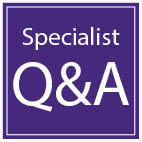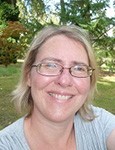 Our editorial industry is made up of people carrying out a huge range of tasks across many different sectors. Although we are bound by common aims – to make text consistent, accurate and clear – our chosen areas of work can differ in fascinating ways.
Our editorial industry is made up of people carrying out a huge range of tasks across many different sectors. Although we are bound by common aims – to make text consistent, accurate and clear – our chosen areas of work can differ in fascinating ways.
Sarah Ryan is a freelance copy-editor. She has answered some questions on her main specialism: secondary science – chemistry.
- Briefly, what’s your work background?
I started out working in Germany as a scientific editor on two chemistry journals. Here I used my chemistry knowledge and learnt editorial skills on the job. After five years I moved to the UK for a job in educational publishing. After seven years in-house I went freelance.
- How long have you specialised in this particular kind of editorial work, and how did you get started?
I started work in educational publishing in 2001. In 2008 I went freelance and it was then that I mainly started working on science books and resources. I have a chemistry degree so that was why I chose science editing, and why I often ended up with the chemistry projects.
- What specific knowledge, experience or qualifications do you need?
Editorial experience, plus in-house or publishing courses, would be the starting point. I have a chemistry degree and PhD and these were useful to get into the area. Once working in the area, one job will often lead to the next. A science teacher with editorial skills is another way to go.
- How do you go about finding work in this area?
Most educational publishers use freelancers for the editing and proofing work (and for other work too sometimes). I have built up contacts at several publishers, and I gain repeat business that way. I also approach publishers on a regular basis if things are looking quiet. Once in this area, it does tend to be busy and I often regrettably end up turning work down. Science publishing happens in waves, and if you know when these are (by checking publishing or educational websites), you can time a speculative request for work for when there is work to be done.
- What do you most enjoy about the work?
I love working with authors and there are several I have worked with for many years through many curriculum changes. I enjoy the variety that even a niche area can bring. I have worked on books, podcasts, videos, teacher files to mention but a few.
- What are the particular challenges?
All of the publishers tend to be publishing to similar deadlines so it can be a bit feast or famine. It also means a lot of repetitive projects – six revision guides all at the same time, followed by three A level text books!
- What’s the worst job you’ve had – and/or the best?
Nothing stands out as a worst job, but the worst jobs generally are the ones with the tightest deadlines and when the manuscript is not in as good a shape as you were led to believe. Editors often need to make up the time lost by late delivery by authors so sometimes I am left feeling that the book is not as good as it could have been. Best jobs are the opposite, or working with a really imaginative and talented author.
- What tips would you give to someone wanting to work in this field?
Know your chemistry. Most of the people who work on the project will not be scientists so it is important to pick up the science errors. Also, don’t expect it to be all about the science – a lot of the time I am preparing artwork lists, filling in meta data sheets and not much actual science at all!
- What is the pay like – and are there any other perks?
The pay in educational publishing compares favourably with other areas of publishing – it is OK. Science editors are appreciated and this can end up paying better than other areas with less specialism.
- What other opportunities do you think editorial work in this area might lead to?
Sometimes people get so caught up in the subject they retrain as a teacher! There are also writing opportunities, sometimes for electronic projects. And schools publishing is expanding all the time with many more opportunities in online publishing.
 Sarah Ryan is an Advanced Professional Member of the SfEP and has been in the publishing business for 20 years (I were a mere babe in arms back then). Moving from academic chemistry to school science has been an opportunity to stay working in an area I enjoy while staying close to how science is being presented to the next generation.
Sarah Ryan is an Advanced Professional Member of the SfEP and has been in the publishing business for 20 years (I were a mere babe in arms back then). Moving from academic chemistry to school science has been an opportunity to stay working in an area I enjoy while staying close to how science is being presented to the next generation.
The views expressed here do not necessarily reflect those of the SfEP
